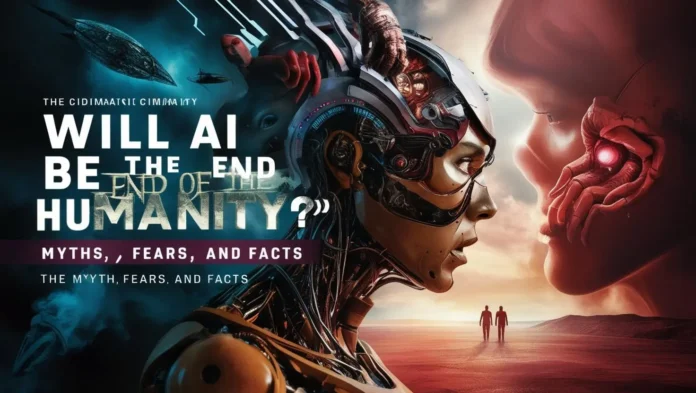From sci-fi movies to tech billionaires’ Twitter feeds, the question “Will AI be the end of humanity?” keeps popping up—and for good reason. As AI systems become more capable, faster, and increasingly autonomous, public concern grows alongside admiration.
But is this fear valid? Or are we just projecting old anxieties onto new technology?
Let’s dive deep into the narratives, fears, facts, and possibilities behind one of the most debated questions of the 21st century.
Contents
- 1 The Roots of the Fear
- 2 Expert Warnings: Justified or Overblown?
- 3 The Real Risks: Not Killer Robots, but Power Structures
- 4 The Singularity Debate
- 5 Can AI Be Aligned With Human Values?
- 6 Who Gets to Control AI?
- 7 Philosophical Reflections: What Makes Us Human?
- 8 Final Thoughts: Fear or Future?
- 9 Internal Links
- 10 Outbound Links
The Roots of the Fear
The idea that machines could turn against humanity isn’t new. It’s been a staple of science fiction for decades—think Skynet from Terminator or HAL 9000 from 2001: A Space Odyssey. These stories reflect a deep cultural anxiety: what happens when we lose control of our own creations?
Today, those fears are no longer just fiction. With large language models like GPT-4, autonomous weapon prototypes, and AI agents learning independently, many experts are taking this question seriously.
Expert Warnings: Justified or Overblown?
- Elon Musk has compared AI development to “summoning the demon.”
- Stephen Hawking warned it could be “the worst event in the history of our civilization.”
- Yoshua Bengio, a pioneer of deep learning, advocates for strong regulations and AI alignment.
These are not your average doomsday prophets—they are scientists and technologists at the forefront.
However, many AI researchers argue that such fears are premature and distract from real risks like bias, surveillance misuse, or data manipulation.
The Real Risks: Not Killer Robots, but Power Structures
Let’s be real: the threat isn’t a rogue AI taking over the world with lasers. It’s more subtle—and perhaps more dangerous:
- Surveillance States: AI is fueling mass monitoring by governments.
- Disinformation: Generative AI can flood the internet with fake content.
- Economic Displacement: Millions of jobs are at risk due to automation.
- Bias & Inequality: AI systems trained on skewed data replicate human discrimination.
These issues are already here. The risk isn’t in the future—it’s now.
The Singularity Debate
The so-called “Technological Singularity” is a hypothetical point where AI surpasses human intelligence and becomes uncontrollable. Some see this as salvation (curing diseases, ending poverty), others as apocalypse.
But here’s the truth: we’re nowhere near artificial general intelligence (AGI)—a system that can truly think, learn, and reason like a human across all domains. Current AI is narrow, task-specific, and lacks common sense.
Even GPT-4, impressive as it is, doesn’t understand the world. It mimics language, it doesn’t live or think.
Can AI Be Aligned With Human Values?
One of the hottest topics in AI safety is “alignment”—ensuring that AI’s goals match human values. It sounds simple but is incredibly complex:
- What values?
- Whose values?
- How do we embed them into code?
Researchers are exploring reinforcement learning from human feedback (RLHF), constitutional AI, and interpretability tools. But we’re still scratching the surface.
Who Gets to Control AI?
Perhaps the biggest question is who will own and govern powerful AI:
- Will it be corporations?
- Governments?
- Open-source communities?
The answer will shape whether AI benefits everyone or just the powerful few. True risk may not come from AI itself, but from how humans choose to wield it.
Philosophical Reflections: What Makes Us Human?
AI raises big questions:
- If a machine can think, is it alive?
- If it can write poems, does it have creativity?
- If it learns to care, can it be conscious?
These aren’t just academic puzzles—they force us to reflect on our own identity as a species.
Final Thoughts: Fear or Future?
So, will AI end humanity? Probably not in a dramatic, Hollywood-style extinction event.
But it could drastically reshape our societies, economies, and even our values. And if we’re not thoughtful—if we chase power and profit over wisdom—it might indeed lead us somewhere we don’t want to go.
The future of AI isn’t written yet. It’s a story we’re all co-authoring—together.
Internal Links
- For more deep dives, visit our AI Blog section.
- Want to learn how AI tools actually work? Check out our AI Guides.

This article raises really important questions. I believe AI will be a tool, not a threat — as long as we stay in control. Thought-provoking read!
I’m deeply invested in AI safety, and this piece summarizes the key concerns quite well. More discussion on regulations would be helpful though.
While I don’t think AI will “end” humanity, I do think we’re underestimating the risks. Thanks for making this complex topic approachable.
Thanks for reading